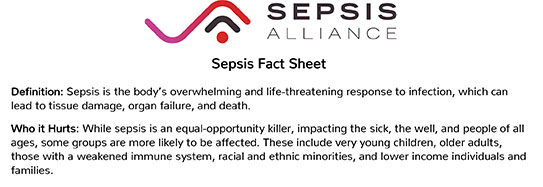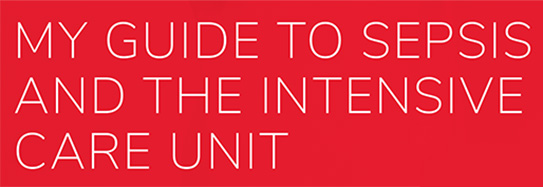Speaking to patients and family members about sepsis is one of the most important things healthcare professionals can do. It can be difficult to find the right approach to discuss the immediate and long-term effects of the condition because sepsis is still not well known or understood.
Sepsis Alliance provides information and resources that can be used by any healthcare professional to help with patient education. Selected downloadable and printable resources can be found at the bottom of the page, with more found in the Resource Library. All downloads are free of charge. If you are looking for professional resources and training, please visit Sepsis Alliance Institute.
The resources found here may also be helpful for patients and family members who have not received such information when they were hospitalized or being discharged.
Website Resources
If you are looking for ways to speak with patients and family members about sepsis, here are some website resources that may help:
- Sepsis Basics: This top menu bar section has links to information like What is Sepsis, Risk Factors, Symptoms, and more.
- Related Conditions: The Sepsis and library addresses over 50 conditions and other circumstances that are somehow connected to sepsis.
- FAQs: Sepsis Alliance has collected many of the most frequently asked questions about sepsis.
- Caregivers: You may find it helpful to give the Caregiver Guide to the patient’s loved ones so they have a better idea of what is happening. Caregivers can also join Sepsis Alliance Connect to find support from others.
- Children: Sepsis Alliance also has resources for children, both for those who have sepsis and for their siblings or other young relatives and friends. Bug, Sepsis Alliance’s friendly ladybug, helps young children understand infections and how to prevent them.
- Post-sepsis syndrome: Many sepsis survivors are left with lasting effects from their illness, including chronic fatigue, depression, and symptoms of PTSD. Post-sepsis syndrome (PSS) is becoming more known in the medical community, but still too many healthcare providers don’t know about or understand the issues related to PSS.
- Support for Survivors and Loved Ones: Sepsis Alliance Connect is a virtual support community designed for the millions of people personally affected by sepsis.
- Multi-Language Resources: Sepsis Alliance has selected resources available in Spanish, Tagalog, Chinese, and Vietnamese. The sepsis.org website can also be translated into multiple languages by clicking the accessibility menu icon that appears on the bottom right corner of every website page.
Updated February 10, 2025.

















































